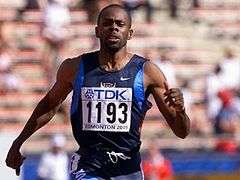Antonio Pettigrew
Antonio Pettigrew (November 3, 1967 – August 10, 2010) was an American sprinter who specialized in the 400 meters.
 | ||||||||||||||||||||||||||||||||
| Personal information | ||||||||||||||||||||||||||||||||
|---|---|---|---|---|---|---|---|---|---|---|---|---|---|---|---|---|---|---|---|---|---|---|---|---|---|---|---|---|---|---|---|---|
| Born | November 3, 1967 Macon, Georgia | |||||||||||||||||||||||||||||||
| Died | August 10, 2010 (aged 42) Chatham County, North Carolina | |||||||||||||||||||||||||||||||
| Height | 1.83 m (6 ft 0 in) | |||||||||||||||||||||||||||||||
| Sport | ||||||||||||||||||||||||||||||||
| Country | ||||||||||||||||||||||||||||||||
| Event(s) | Athletics | |||||||||||||||||||||||||||||||
| Achievements and titles | ||||||||||||||||||||||||||||||||
| Personal best(s) | see Personal bests | |||||||||||||||||||||||||||||||
Medal record
| ||||||||||||||||||||||||||||||||
Life
Pettigrew was born in Macon, Georgia.
While attending St. Augustine's College in Raleigh, North Carolina, Pettigrew was a four-time NCAA Division II champion in the 400 meter race.[1] He came to prominence at the 1991 World Championships, where he won the 400 m gold medal and a silver medal in the 4 x 400 meters relay.
At the 2000 Summer Olympics in Sydney, Pettigrew threw his gold medal-winning Adidas spikes into the crowd after winning the 4 × 400 m final for the USA.[2]
Doping
In 2008, prosecution documents related to the trial of coach Trevor Graham listed Pettigrew as one of Graham's athletes to have used performance-enhancing drugs.[3] Pettigrew then admitted to using performance-enhancing drugs and testified against Graham at his trial in May 2008.[4] Although the IAAF rules currently do not retroactively alter results more than eight years after the event, Pettigrew voluntarily returned the medals he won in that period.[5][6] The 2000 Sydney Olympics 4 × 400 m U.S. relay team was stripped of their medals after Pettigrew admitted that he had used performance-enhancing drugs during that time.[7] He received a two-year athletics ban in 2008, even though he had already retired from the track by then.[5]
Death
Pettigrew was found dead at age 42 in the back seat of his locked car in Chatham County, North Carolina, on August 10, 2010, and evidence of sleeping pills was found by police. On October 13, an autopsy report stated that he had committed suicide by overdosing on a medication containing diphenhydramine.[8][9] Pettigrew was an assistant coach at the University of North Carolina at the time of his death.[10]
Personal bests
| Event | Time (seconds) | Venue | Date |
|---|---|---|---|
| 100 meters | 10.42 | Raleigh, North Carolina, United States | March 26, 1994 |
| 200 meters | 20.38 | Durham, North Carolina, United States | April 9, 1994 |
| 300 meters | 32.33 | Jerez de la Frontera, Spain | September 13, 1989 |
| 400 meters | 44.27 | Houston, Texas, United States | June 17, 1989 |
See also
- BALCO Scandal
- List of sportspeople sanctioned for doping offences
References
- "For The Record". Sports Illustrated. 113 (6). 2010-08-23. Archived from the original on 28 August 2010. Retrieved 2010-08-23.
- Melbourne Herald, Sun 10 Oct 2000, p. 71.
- "Olympic relay champion Pettigrew was doping: report". AFP. May 3, 2008. Archived from the original on May 20, 2011. Retrieved 2008-05-04.
- Doped-up Pettigrew denied GB gold. BBC Sport May 23, 2008. Retrieved on 2009-03-10.
- Pettigrew given two-year dope ban. BBC Sport June 3, 2008. Retrieved on 2009-03-10.
- Sprinter Pettigrew to return gold, accepts ban Archived June 7, 2008, at the Wayback Machine. AFP June 3, 2008. Retrieved on 2009-03-10.
- "Pollution, Internet, doping dominate Olympics lead-up". CNN. August 2, 2008. Archived from the original on 6 March 2009. Retrieved 2009-03-10.
- "''Autopsy Files''" (PDF). Retrieved 2012-04-11.
- A.J. Perez %BloggerTitle% (2010-10-13). "Autopsy: Antonio Pettigrew, Ex-Olympian, Committed Suicide". Fanhouse.com. Retrieved 2012-04-11.
- "BALCO grand jury is likely targeting Trevor Graham". ESPN. October 25, 2006. Retrieved 2008-01-11.
- "Pettigrew, Antonio biography". IAAF. Retrieved 2009-03-10.
- "Pettigrew, Antonio profile". All-Athletics. Retrieved 2012-07-22.
